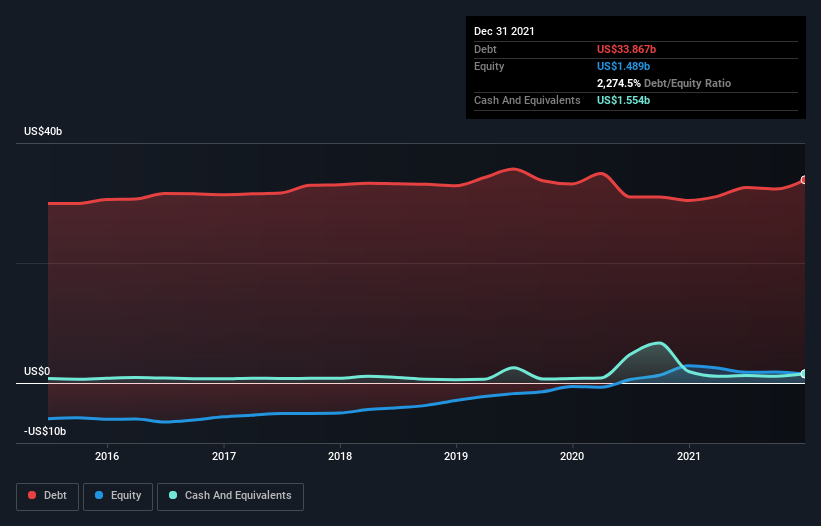- United States
- /
- Healthcare Services
- /
- NYSE:HCA
HCA Healthcare (NYSE:HCA) Has A Pretty Healthy Balance Sheet

Warren Buffett famously said, 'Volatility is far from synonymous with risk.' It's only natural to consider a company's balance sheet when you examine how risky it is, since debt is often involved when a business collapses. We can see that HCA Healthcare, Inc. (NYSE:HCA) does use debt in its business. But should shareholders be worried about its use of debt?
When Is Debt Dangerous?
Debt assists a business until the business has trouble paying it off, either with new capital or with free cash flow. If things get really bad, the lenders can take control of the business. While that is not too common, we often do see indebted companies permanently diluting shareholders because lenders force them to raise capital at a distressed price. Of course, plenty of companies use debt to fund growth, without any negative consequences. When we think about a company's use of debt, we first look at cash and debt together.
Check out our latest analysis for HCA Healthcare
What Is HCA Healthcare's Net Debt?
As you can see below, at the end of December 2021, HCA Healthcare had US$33.9b of debt, up from US$30.4b a year ago. Click the image for more detail. However, it also had US$1.55b in cash, and so its net debt is US$32.3b.

How Strong Is HCA Healthcare's Balance Sheet?
We can see from the most recent balance sheet that HCA Healthcare had liabilities of US$9.58b falling due within a year, and liabilities of US$39.7b due beyond that. Offsetting these obligations, it had cash of US$1.55b as well as receivables valued at US$8.11b due within 12 months. So it has liabilities totalling US$39.6b more than its cash and near-term receivables, combined.
This deficit isn't so bad because HCA Healthcare is worth a massive US$78.1b, and thus could probably raise enough capital to shore up its balance sheet, if the need arose. But we definitely want to keep our eyes open to indications that its debt is bringing too much risk.
In order to size up a company's debt relative to its earnings, we calculate its net debt divided by its earnings before interest, tax, depreciation, and amortization (EBITDA) and its earnings before interest and tax (EBIT) divided by its interest expense (its interest cover). This way, we consider both the absolute quantum of the debt, as well as the interest rates paid on it.
HCA Healthcare has a debt to EBITDA ratio of 2.6 and its EBIT covered its interest expense 6.2 times. Taken together this implies that, while we wouldn't want to see debt levels rise, we think it can handle its current leverage. It is well worth noting that HCA Healthcare's EBIT shot up like bamboo after rain, gaining 33% in the last twelve months. That'll make it easier to manage its debt. When analysing debt levels, the balance sheet is the obvious place to start. But it is future earnings, more than anything, that will determine HCA Healthcare's ability to maintain a healthy balance sheet going forward. So if you're focused on the future you can check out this free report showing analyst profit forecasts.
But our final consideration is also important, because a company cannot pay debt with paper profits; it needs cold hard cash. So the logical step is to look at the proportion of that EBIT that is matched by actual free cash flow. During the last three years, HCA Healthcare produced sturdy free cash flow equating to 63% of its EBIT, about what we'd expect. This free cash flow puts the company in a good position to pay down debt, when appropriate.
Our View
HCA Healthcare's EBIT growth rate suggests it can handle its debt as easily as Cristiano Ronaldo could score a goal against an under 14's goalkeeper. But truth be told we feel its level of total liabilities does undermine this impression a bit. It's also worth noting that HCA Healthcare is in the Healthcare industry, which is often considered to be quite defensive. Looking at all the aforementioned factors together, it strikes us that HCA Healthcare can handle its debt fairly comfortably. On the plus side, this leverage can boost shareholder returns, but the potential downside is more risk of loss, so it's worth monitoring the balance sheet. The balance sheet is clearly the area to focus on when you are analysing debt. However, not all investment risk resides within the balance sheet - far from it. For example, we've discovered 2 warning signs for HCA Healthcare that you should be aware of before investing here.
At the end of the day, it's often better to focus on companies that are free from net debt. You can access our special list of such companies (all with a track record of profit growth). It's free.
Valuation is complex, but we're here to simplify it.
Discover if HCA Healthcare might be undervalued or overvalued with our detailed analysis, featuring fair value estimates, potential risks, dividends, insider trades, and its financial condition.
Access Free AnalysisHave feedback on this article? Concerned about the content? Get in touch with us directly. Alternatively, email editorial-team (at) simplywallst.com.
This article by Simply Wall St is general in nature. We provide commentary based on historical data and analyst forecasts only using an unbiased methodology and our articles are not intended to be financial advice. It does not constitute a recommendation to buy or sell any stock, and does not take account of your objectives, or your financial situation. We aim to bring you long-term focused analysis driven by fundamental data. Note that our analysis may not factor in the latest price-sensitive company announcements or qualitative material. Simply Wall St has no position in any stocks mentioned.
About NYSE:HCA
HCA Healthcare
Through its subsidiaries, owns and operates hospitals and related healthcare entities in the United States.
Undervalued low.
Similar Companies
Market Insights
Community Narratives




